
Sou Fujimoto: Primitive Future - Everything is circulating
Zdroj
Aedes Architecture Forum
Aedes Architecture Forum
Vložil
Tisková zpráva
14.07.2023 11:35
Tisková zpráva
14.07.2023 11:35
Výstavy
Německo
Berlín
Sou Fujimoto
Sou Fujimoto is a visionary architect who is rethinking the relationship with the natural and the built environment. In his poetic projects, the Japanese architect aims for a balance between order and disorder, simplicity and complexity—since physical boundaries are supposed to dissolve visually in his architecture. On the occasion of Fujimoto being honoured as the AW Architect of the Year 2023, the exhibition at Aedes is dedicated to his experimental approach. An expansive installation represents a selection of projects, including ‘stacked’ houses with associations to mountains, structures that follow the form of trees, or roofs on which small forests grow. Together, they reflect an architectural philosophy that Sou Fujimoto himself describes as a Primitive Future: architecture in harmony with people and nature.
Sou Fujimoto, who was born and grew up on the Japanese island of Hokkaido, developed a strong interest in nature starting in his childhood. In contrast to this, he studied architecture in an antithetical, artificial, urban situation: in Tokyo, Japan’s most populous metropolis. This resulted in the fact that Fujimoto addresses the relationship between architecture and nature as an essential component in his work. “Today, we find ourselves confronted with global problems: natural catastrophes, earthquakes, climate change and a pandemic. I think that architecture will be connected with nature to a greater extent in the future. This means that we reflect on architecture as nature and simultaneously regard nature as architecture,” Fujimoto explains.
Everything Is Connected When Sou Fujimoto conceives his architecture, he starts from a basis that he refers to as ‘primitive’: the original, multi-layered relationship between human beings and nature. In spite of the dichotomy between nature and architecture, he strives to integrate both into his projects to an equal extent. He thus sounds out how differences can not only be neutralised, but also come to resonate diffusely with one another—and therefore give rise to new ‘places’. Sou Fujimoto explains: “Everything is different, yet connected. Being one and being many at the same time. Simple, but complex. I am interested in an architecture that truly stands in harmony with nature, the city and people.”
Based on this architectural philosophy, over the past twenty years, Sou Fujimoto has developed an extensive and fascinating portfolio, predominantly in Japan and China, but also in Europe. With the tree-like residential tower L'Arbre Blanc (2019) in Montpellier, for instance, he succeeded in a masterful way in combining functionality with a design characterised by an origami-like lightness—creating an amazing poetic piece of architecture. Similar to the House of Music (2022) in Budapest, where Fujimoto gives rise to playful interactions and relationships between the users and the organically shaped, partly transparent building, which merges with the surrounding nature in the municipal park of the Hungarian capital. With his minimal and trenchant design interventions in the narrowness of urban space, Fujimoto has created a balance between nature and humans that sparks a maximum degree of positive identification with the location and facilitates a sensuous spatial experience.
Exhibition Primitive Future—Everything Is Circulating is dedicated to twelve projects by Sou Fujimoto Architects that have either been realised or are in planning. In the first room of the exhibition, twelve films provide insights into the process of designing the multifaceted typologies and forms. The reference to Fujimoto’s architectural philosophy is presented in the second room of the exhibition: an expansive installation expresses the notion of an connected world based on twelve floating wire objects. They can be read in a line as people, nature, geography and architecture, circulating as a metamorphosis. Depending on the viewpoint, various scales and scenes can appear as a three-dimensional drawing in a space that is connected and stands in harmony with various things.
About Sou Fujimoto Architects Sou Fujimoto Architects is a firm founded in Tokyo in 2000 devoted to international projects in the fields of architecture, urbanism, research and innovation. The Sou Fujimoto Atelier Paris was set up in 2016 as an additional location. The firm employs an international team consisting of roughly 80 architects. The numerous awards it has received include: the AR Award Grand Prize and 2008 Japan Institute of Architects Grand Prize for the Children’s Psychiatric Rehabilitation Center, first prize at the World Architectural Festival 2008 in Barcelona, the Wallpaper Award 2009, as well as the New London Award 2013 for the Serpentine Pavilion and the Marcus Prize 2013.
Sou Fujimoto, who was born and grew up on the Japanese island of Hokkaido, developed a strong interest in nature starting in his childhood. In contrast to this, he studied architecture in an antithetical, artificial, urban situation: in Tokyo, Japan’s most populous metropolis. This resulted in the fact that Fujimoto addresses the relationship between architecture and nature as an essential component in his work. “Today, we find ourselves confronted with global problems: natural catastrophes, earthquakes, climate change and a pandemic. I think that architecture will be connected with nature to a greater extent in the future. This means that we reflect on architecture as nature and simultaneously regard nature as architecture,” Fujimoto explains.
Everything Is Connected When Sou Fujimoto conceives his architecture, he starts from a basis that he refers to as ‘primitive’: the original, multi-layered relationship between human beings and nature. In spite of the dichotomy between nature and architecture, he strives to integrate both into his projects to an equal extent. He thus sounds out how differences can not only be neutralised, but also come to resonate diffusely with one another—and therefore give rise to new ‘places’. Sou Fujimoto explains: “Everything is different, yet connected. Being one and being many at the same time. Simple, but complex. I am interested in an architecture that truly stands in harmony with nature, the city and people.”
Based on this architectural philosophy, over the past twenty years, Sou Fujimoto has developed an extensive and fascinating portfolio, predominantly in Japan and China, but also in Europe. With the tree-like residential tower L'Arbre Blanc (2019) in Montpellier, for instance, he succeeded in a masterful way in combining functionality with a design characterised by an origami-like lightness—creating an amazing poetic piece of architecture. Similar to the House of Music (2022) in Budapest, where Fujimoto gives rise to playful interactions and relationships between the users and the organically shaped, partly transparent building, which merges with the surrounding nature in the municipal park of the Hungarian capital. With his minimal and trenchant design interventions in the narrowness of urban space, Fujimoto has created a balance between nature and humans that sparks a maximum degree of positive identification with the location and facilitates a sensuous spatial experience.
Exhibition Primitive Future—Everything Is Circulating is dedicated to twelve projects by Sou Fujimoto Architects that have either been realised or are in planning. In the first room of the exhibition, twelve films provide insights into the process of designing the multifaceted typologies and forms. The reference to Fujimoto’s architectural philosophy is presented in the second room of the exhibition: an expansive installation expresses the notion of an connected world based on twelve floating wire objects. They can be read in a line as people, nature, geography and architecture, circulating as a metamorphosis. Depending on the viewpoint, various scales and scenes can appear as a three-dimensional drawing in a space that is connected and stands in harmony with various things.
About Sou Fujimoto Architects Sou Fujimoto Architects is a firm founded in Tokyo in 2000 devoted to international projects in the fields of architecture, urbanism, research and innovation. The Sou Fujimoto Atelier Paris was set up in 2016 as an additional location. The firm employs an international team consisting of roughly 80 architects. The numerous awards it has received include: the AR Award Grand Prize and 2008 Japan Institute of Architects Grand Prize for the Children’s Psychiatric Rehabilitation Center, first prize at the World Architectural Festival 2008 in Barcelona, the Wallpaper Award 2009, as well as the New London Award 2013 for the Serpentine Pavilion and the Marcus Prize 2013.
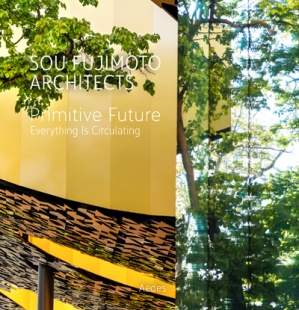
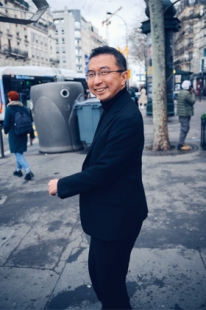
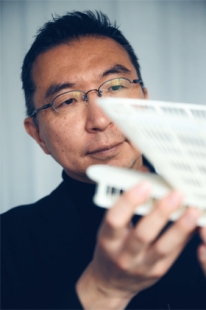
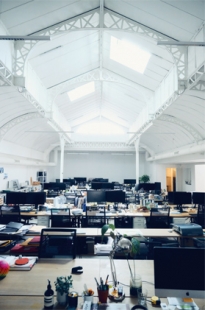
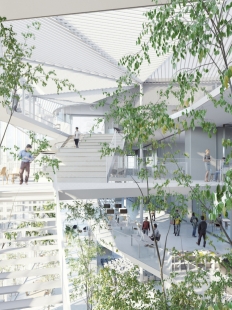
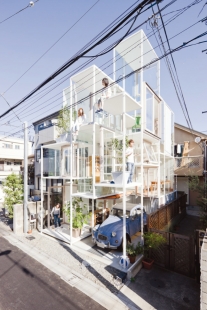
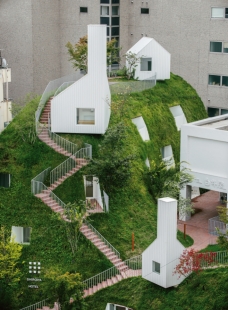
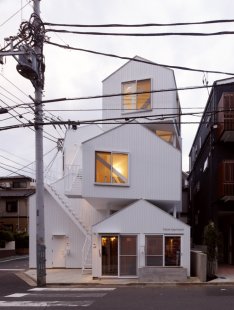
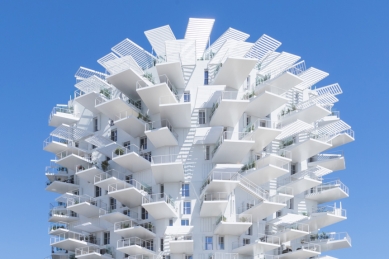
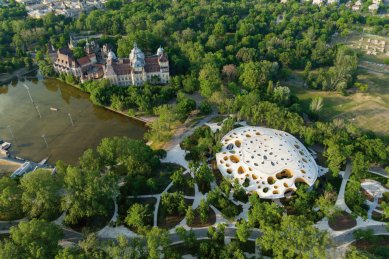
0 komentářů
přidat komentář












